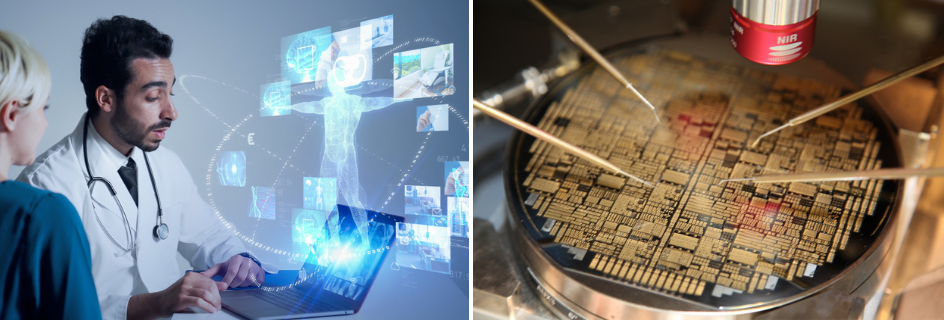Post date:
The University is set to establish two research hubs that will focus on developing AI tools to help revolutionise the fields of electronics and healthcare.
Using AI to develop more efficient semiconductors, design more complex microchips, and improve the early prediction of debilitating diseases are some of the potential outcomes of the £24m funding from the Engineering and Physical Sciences Research Council (EPSRC).
Of the nine centres announced as part of EPSRC’s £80m UK-wide investment in applying AI to real world data and research, Edinburgh will lead or be involved in more than half, further cementing its place as a driving force in the development of AI in the UK.
AI Hub for Productive Research and Innovation in Electronics (APRIL)
The AI Hub for Productive Research and Innovation in Electronics (APRIL) will seek to bring the benefits of AI to the UK electronics industry.
APRIL will develop AI tools to accelerate the development of key components such as new semiconductor materials, complex microchip designs and system architectures – leading to faster, cheaper, greener and overall more power-efficient electronics.
APRIL will be led by Edinburgh’s Regius Chair of Engineering, Professor Themis Prodromakis.
EPSRC AI Hub for Causality in Healthcare AI with Real Data (CHAI)
The EPSRC AI Hub for Causality in Healthcare AI with Real Data (CHAI) will develop new ways of unearthing important links in complex health data.
CHAI aims to develop AI that can empower decision making tools to improve challenging tasks such as the early prediction, diagnosis and prevention of disease, and – crucially – to improve the safety of such technology in healthcare.
Researchers hope to apply this new technology to tackle key societal health challenges such as understanding infection, Alzheimer’s, improving cancer treatments, social care, diabetes, and rehabilitation.
CHAI will be led by Edinburgh’s Professor Sotirios Tsaftaris, Canon Medical/RAEng Chair in Healthcare AI.
Both hubs, which will receive £12m each from the EPSRC, are led by academics in the School of Engineering and involve researchers from the School of Informatics, School of Mathematics, the College of Medicine and Veterinary Medicine and the Bayes Centre – the University’s innovation hub for data science and AI.
Head of the School of Engineering, Professor Gareth Harrison, commented:
“I’m thrilled that we are leading on such prestigious national entities and our academics will contribute their expertise to developing these innovative areas of AI.
“By taking a leadership role in tackling complex issues in healthcare and electronics through the CHAI and APRIL AI hubs, our work will transform these fields and accelerate innovations at a pace that has not been possible before now.”
Professor Sotirios (Sotos) Tsaftaris, Director of the CHAI AI Hub, said:
“I'm delighted that the University of Edinburgh will be leading this world-leading consortium to develop next generation Causal AI. Causal AI holds tremendous promise for creating a new generation of AI solutions that are more robust, fair, safe, and transparent. Causal AI offers a step change in what AI can do for health with the proper safeguards. To fulfill this vision, CHAI brings together an incredible team from across the UK (Imperial, Manchester, UCL, Exeter, KCL), several affiliated researchers and domain experts, as well as more than 50 world-leading partner organisations to work together to co-create solutions thoroughly integrating ethical and societal aspects.
“I am extremely excited to lead this hub, particularly because of the strong people focus ensuring that we prepare the next generation of researchers in such cutting-edge AI methods.”
Professor Themis Prodromakis, Director for the APRIL AI Hub, added:
“The APRIL AI Hub aspires to unite the electronics and AI community for developing and bringing to market AI-based tools for boosting the productivity of engineers across the entire electronics industry supply chain.
“The UK is home to world-leading expertise in semiconductor technologies, microelectronics design and AI and combining these would allow us to be differentially better than other leading economies in the optimisation and delivery of next generation electronics.”
The investment is further recognition of the School’s world-leading expertise in AI. Edinburgh has a rich heritage in the area. In 1963 we were the first university in Europe to create a research group in AI and computer science.



